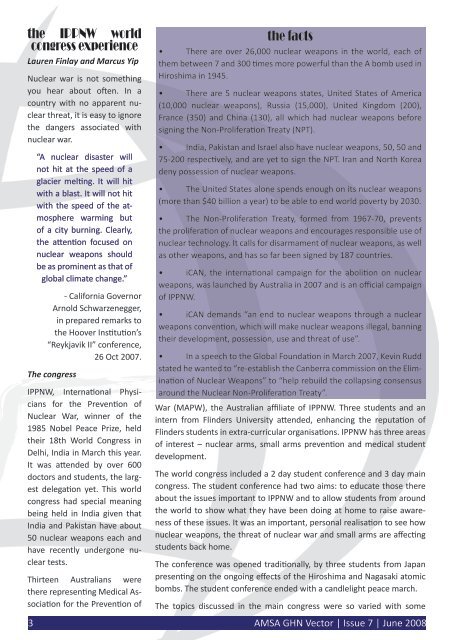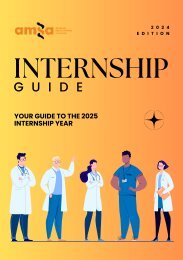Create successful ePaper yourself
Turn your PDF publications into a flip-book with our unique Google optimized e-Paper software.
the IPPNW world<br />
congress experience<br />
Lauren Finlay and Marcus Yip<br />
Nuclear war is not something<br />
you hear about often. In a<br />
country with no apparent nuclear<br />
threat, it is easy to ignore<br />
the dangers associated with<br />
nuclear war.<br />
“A nuclear disaster will<br />
not hit at the speed of a<br />
glacier melting. It will hit<br />
with a blast. It will not hit<br />
with the speed of the atmosphere<br />
warming but<br />
of a city burning. Clearly,<br />
the attention focused on<br />
nuclear weapons should<br />
be as prominent as that of<br />
global climate change.”<br />
- California Governor<br />
Arnold Schwarzenegger,<br />
in prepared remarks to<br />
the Hoover Institution’s<br />
“Reykjavik II” conference,<br />
26 Oct 2007.<br />
The congress<br />
IPPNW, International Physicians<br />
for the Prevention of<br />
Nuclear War, winner of the<br />
1985 Nobel Peace Prize, held<br />
their 18th World Congress in<br />
Delhi, India in March this year.<br />
It was attended by over 600<br />
doctors and students, the largest<br />
delegation yet. This world<br />
congress had special meaning<br />
being held in India given that<br />
India and Pakistan have about<br />
50 nuclear weapons each and<br />
have recently undergone nuclear<br />
tests.<br />
Thirteen Australians were<br />
there representing Medical Association<br />
for the Prevention of<br />
the facts<br />
• There are over 26,000 nuclear weapons in the world, each of<br />
them between 7 and 300 times more powerful than the A bomb used in<br />
Hiroshima in 1945.<br />
• There are 5 nuclear weapons states, United States of America<br />
(10,000 nuclear weapons), Russia (15,000), United Kingdom (200),<br />
France (350) and China (130), all which had nuclear weapons before<br />
signing the Non-Proliferation Treaty (NPT).<br />
• India, Pakistan and Israel also have nuclear weapons, 50, 50 and<br />
75-200 respectively, and are yet to sign the NPT. Iran and North Korea<br />
deny possession of nuclear weapons.<br />
• The United States alone spends enough on its nuclear weapons<br />
(more than $40 billion a year) to be able to end world poverty by 2030.<br />
• The Non-Proliferation Treaty, formed from 1967-70, prevents<br />
the proliferation of nuclear weapons and encourages responsible use of<br />
nuclear technology. It calls for disarmament of nuclear weapons, as well<br />
as other weapons, and has so far been signed by 187 countries.<br />
• iCAN, the international campaign for the abolition on nuclear<br />
weapons, was launched by Australia in 2007 and is an official campaign<br />
of IPPNW.<br />
• iCAN demands “an end to nuclear weapons through a nuclear<br />
weapons convention, which will make nuclear weapons illegal, banning<br />
their development, possession, use and threat of use”.<br />
• In a speech to the Global Foundation in March 2007, Kevin Rudd<br />
stated he wanted to “re-establish the Canberra commission on the Elimination<br />
of Nuclear Weapons” to “help rebuild the collapsing consensus<br />
around the Nuclear Non-Proliferation Treaty”.<br />
War (MAPW), the Australian affiliate of IPPNW. Three students and an<br />
intern from Flinders University attended, enhancing the reputation of<br />
Flinders students in extra-curricular organisations. IPPNW has three areas<br />
of interest – nuclear arms, small arms prevention and medical student<br />
development.<br />
The world congress included a 2 day student conference and 3 day main<br />
congress. The student conference had two aims: to educate those there<br />
about the issues important to IPPNW and to allow students from around<br />
the world to show what they have been doing at home to raise awareness<br />
of these issues. It was an important, personal realisation to see how<br />
nuclear weapons, the threat of nuclear war and small arms are affecting<br />
students back home.<br />
The conference was opened traditionally, by three students from Japan<br />
presenting on the ongoing effects of the Hiroshima and Nagasaki atomic<br />
bombs. The student conference ended with a candlelight peace march.<br />
The topics discussed in the main congress were so varied with some<br />
3 AMSA GHN <strong>Vector</strong> | <strong>Issue</strong> 7 | June <strong>2008</strong>

















